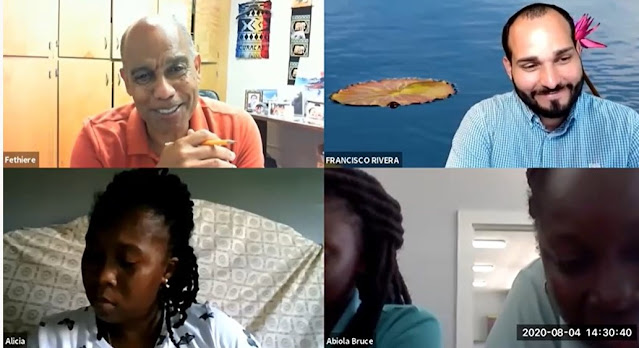Creating Balanced Rations for Livestock in Guyana
The animal nutrition laboratory of the Guyana Livestock Development Agency (GLDA) needed to train its new staff in proper laboratory management. Therefore, they requested a F2F volunteer to improve the capacity of their staff to perform basic functions of the animal nutrition lab. Mr. Francisco Rivera started working on this assignment in July 2020 and completed it in October 2020. He holds a BSc in Crops and Agro-Environmental Sciences, a MSc in Agricultural Science with a Major in Animal Science, an MBA and a Certification in Animal Nutrition. He is currently an Agriculture and Natural Resources Extension Agent at the University of Florida, where he plans and executes educational programs that focus on improving the viability of small farm livestock operations.
Mr. Rivera met online with the laboratory staff several times during the assignment. He started by identifying their needs in terms of training, which included help with the use of their Near-infrared Spectroscopy (NIRS) Feed Analyzer, laboratory Standard Operation Procedures (SOPs), and balance feed rations for livestock to increase the use of local options. Five staff members were trained to improve laboratory safety procedures and their animal science skills, and in this way enhance the availability of laboratory services to Guyanese farmers using science-based information. Together with the University of Florida Institute of Food and Agricultural Sciences (UF/IFAS) Laboratory Manager, GLDA staff learned to create SOPs, use the Feed Analyzer, balance and mix the feed ratios based on the animal nutritional requirements, and identify possible applications for formulating rations.
During the online sessions GLDA staff were also taught how to use body condition scores, to process laboratory samples, and the basics of agronomics. They also shared their ideas to substitute 30% of their commercial feed for locally formulated feed. At the end of the assignment, Mr. Rivera and the local volunteer he was paired with, recommended that the GLDA animal laboratory staff:
- Start collecting data to create the SOPs
- Include an animal nutritionist in their team
- Acquire tools for testing the soil nutrients and pH
- Improve the internet speed and connectivity of the lab, and
- Obtain backup batteries for the feed analyzer.
Thanks to Mr. Rivera’s support, GLDA staff members are now better prepared to create balanced rations to meet the dietary needs of livestock, utilizing local materials.
“COVID19 provides new opportunities to develop educational skills. We had the chance to connect with the laboratory members virtually, which showed us a different way to communicate with people all over the world. Thinking about this project, I believe connecting with people online before visiting the country is the best way to have an assessment of the country's needs. Something that for us is normal could be a challenge in another country. Understanding the needs of our audience and identifying how we can help before visiting the country can help us recognize uncertainties and the resources to provide a better service.
This collaboration helped us share our knowledge with others but at the same time, allowed us to grow as individuals and professionals. I am amazed by how grateful the laboratory team was and by their willingness to improve their laboratory procedures and practices. This project brought us great personal satisfaction. I am proud to be part of this GDLA initiative and see many opportunities to help farmers be more productive and follow practices to conserve natural resources for the next generations in Guyana.
Now I feel I have new friends in Guyana, and I hope to have one day the opportunity to visit the team and see the laboratory progressing. From the depth of my heart, I want to thank all the people who made this effort possible, who increased the connections and collaboration with other professionals and researchers. I like to recognize the commitment of Richard Fethiere, the UF/IFAS Laboratory Manager as he shared his over 30 years of experience with the laboratory staff and me. His leadership made this project easier. Thank you for improving our laboratory skills during these months collaborating on this project.”




.png)

Comments
Post a Comment